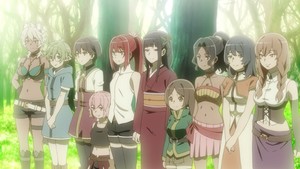
[ad_1]

And hast thou slain the Juggernaut? Come to my arms, my beamish girl!
If I may be forgiven for bowdlerizing Lewis Carroll‘s Jabberwocky, it’s important to acknowledge that Ryu, not Bell, was the main author of the Juggernaut’s death. (And I love that poem.) First of all, it’s relatively uncommon in this sort of story for the hero not to be the primary killer of an antagonist; Bell does land decisive blows, but most of the credit belongs to Ryu. But more than just taking out the season’s bad guy, the Juggernaut’s death is the culmination of Ryu’s trauma, the sign that she’s ready to move on with her life. The loss of Astrea Familia froze Ryu in time, suspending her in the crystallization of her guilt and pain. When she brings down the beast, she’s also breaking free of what held her trapped. By the Juggernaut’s death, largely at her hand, she is announcing that she will move forward.
It’s going to take a lot of work. You don’t just “get over” something like what she went through. But the hardest steps are the first ones, and in admitting that she’s not ready to give up the ghost just yet, Ryu has taken them. “Give up the ghost” has a deliberate double meaning here – in the colloquial, it means to admit defeat, but for Ryu, it also speaks to the fact that she won’t forget her Familia. She quite literally calls upon them in the final battle, shoring up her resolve by summoning their spirits with each blow she strikes. Are they really there? I want to think so, but the more important piece is that Ryu knows they are. Her discussion with them on the shores of whatever river separates the lands of the living and the dead (a common theme across world mythologies) confirms what she most needed to hear: no one blames her. Everyone wants her to be happy, and to keep living her life. They didn’t leave her alone because they didn’t love her; they did it because they did. It’s something she needed to hear from Alise’s own mouth. And now that she knows, she can feel that they’ll always be there, watching her live the life they gave her.
Ryu may be chronologically older than Bell, but emotionally they’re probably about the same age. She’s been stagnant for so long that she hasn’t had the chance to grow into herself. If you ship them, that’s important, but in terms of storytelling, it allows Ryu to grow. We’d never have seen her in that cute dress she wore at the episode’s end. Her ability to dress up and go out, coupled with her willingness to take Bell to a place special to Alise, shows how far she’s come.
Bell may be the protagonist of this series, but this cour really belonged to Ryu. She says it herself when she decides she won’t be the Lady of the Lake anymore, waiting for a knight in shining armor. In Arthurian lore, the Lady of the Lake is (currently) best known as the fey being who gives King Arthur Excalibur in non-The Sword in the Stone variants of the legend. Ryu’s words imply that the Lady needs to give a knight a sword because she can’t use it herself, but Ryu will no longer do that. She’ll take up Excalibur herself and defeat the monster, saving herself alongside the knight. It’s the best way she can return what Alise did for her, and maybe at the end of her life, Alise will fulfill another of the Lady’s roles for her: bringing the hero home to the sacred isle.
But that’s a long time in the future. For now, Ryu just needs to focus on living once more.
Rating:
Is It Wrong to Try to Pick Up Girls in a Dungeon? IV is currently streaming on
HIDIVE.
[ad_2]





